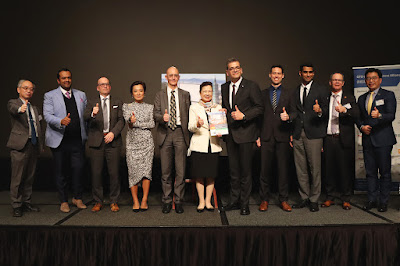
“The vast majority of German companies operating in Taiwan is healthy and profitable, and 2022 was another successful business year. Looking back on three years of COVID-19 pandemic, we see that German companies have emerged from it relatively unscathed. Even though 53.4 percent were negatively impacted during the pandemic, only a minor proportion of 5.6 percent has experienced lasting damages. 20.0 percent were even able to benefit from Taiwan’s special economic conditions,” stated Axel Limberg, Chief Representative and Executive Director of the German Trade Office Taipei during the presentation of the results. “However, the survey results also revealed that macroeconomic challenges such as disrupted supply chains not only caused revenues to slightly decrease, but also weigh on the overall business sentiment.”
In 2022, revenues on the upper end of the scale slightly decreased compared to the previous two years. Furthermore, over two-thirds (66.7%) stated that their local business operations were negatively affected by disrupted global supply chains, mainly on the import side (61.7%).
44.4 percent cited to invest in Taiwan within the next two years, which is on a similar level as in the previous five years. Staff development and market development remain the top priorities for investments. However, there is also a greater reluctance to make unplanned investments compared to previous years. According to the survey-takers, the main reasons not to invest are low market expectations (43.5%) and the uncertainties about the further development of cross-strait relations (32.6%). Especially the latter saw a significant increase by 17.8 percentage points from 2020 to 2022.
Asked specifically about the negative effects of increased cross-strait tensions in 2022, every fourth (24.5%) company stated that their supply chains were significantly negatively affected. Furthermore, cross-strait tensions are increasingly seen as a potential future business challenge, recording a steep increase from 44.7 percent in 2021 to 54.4 percent in 2022. However, the main potential business challenge for local business operations remains the global economic growth (62.2%), followed by Taiwan’s domestic economic growth (61.1%).
Compared to last year, German companies gave a more reserved prediction of Taiwan’s economic development in the upcoming years. 52.2 percent estimate that the economy will remain the same in 2023, only 23.4 percent expect the economy to improve. However, this assessment can probably be attributed to high GDP growth rates of between 2.4 and 6.6 percent in recent years.
Predictions for local business developments were also lower: 39.3 percent forecast a decrease in turnover, which is a significant decrease from last year’s result (64.9%). 29.5 percent assume that they will face lower profitability. The outlook on achieving future business targets hit a three-year low. While in 2021 93.4 percent were optimistic to reach at least most of their business targets in the following year, the value for 2023 dropped to 74.5 percent.
Despite a somewhat gloomy outlook on future business development, Taiwan remains an attractive market for German companies. The survey also revealed that 96.7 percent stated to remain in Taiwan and not shift investments to another country. 93.3 percent indicated that they would restart their business in Taiwan again, if they faced such a decision.
Other Key Findings
of the Business Confidence Survey 2022/2023:
·
56.6%
reported an increase in their EBIT margins, which is on a similar level with
2021.
·
63.3% consider
the reliability of business relations as the most valued aspect in Taiwan.
·
Over
one-third (36.4%) consider Taiwan as important for developing new markets in
third countries.
·
Besides
the absence of free trade and investment protection agreements with the EU (23.3%),
difficulties with attracting and retaining qualified staff (21.1%) as well as
talent shortages (17.8%) pose the biggest domestic challenges.
· Energy transition (33.3%) and digitalization (27.8%) are seen as key factors that may have a substantial impact on business operations.
The Business
Confidence Survey 2022/2023 Report was ceremoniously handed over to Ms. Wang
Mei-hua, Minister of Economic Affairs (MOEA), during the GTO Economic Outlook
2023 on February 9, 2023. Dr. Jörg Polster, Director General of the German
Institute Taipei, was another guest of honor who delivered welcoming remarks. Mr.
Alexander Hirschle, Director Taiwan and Philippines Asia-Pacific of GERMANY
TRADE & INVEST provided an overview of Taiwan’s economic challenges and
perspectives of 2023. Furthermore, six representatives of renowned German companies
gave insights into the state and prospects of their business sectors. The speakers
were:
·
Mr. Rahil
Ansari, CEO & Chairman, Volkswagen Group Taiwan Co. Ltd
·
Mr. Fabian
Bergeron, Head of Smart Infrastructure, Energy Management, Siemens Limited Smart Infrastructure
·
Dr. John
Lee, Managing Director, Merck Group in Taiwan
·
Ms. Monica
Liu, Country Manager - Offshore Wind, Taiwan RWE Renewables
·
Mr. Aditya
Ramkrishna, Vice President, Siemens Ltd., Taiwan
· Mr. Andreas Schmidt, Chairman & Managing Director, Bosch Taiwan
The Business Confidence Survey (BCS) 2022/2023 was conducted between December 9, 2022 and January 10, 2023. Of the 251 eligible respondents, 90 filled out the survey for a high response rate of around 36%.
Visit
the website of the German Trade Office Taipei to read the whole Business Confidence
Survey 2022/2023 Report:
https://taiwan.ahk.de/information-hub/publications/business-confidence-survey